Life extension refers to practices, scientific research, and technologies aimed at extending the human lifespan, helping people live longer while maintaining a high quality of life. The concept isn’t just about adding more years to your life—it’s about making those years full of vitality, energy, and health. The goal is to enable you to live to a ripe old age without experiencing the common physical and mental decline that many people face.
The Impact of a Longer, Healthier Life on Society
Life Extension and Community Engagement
Imagine a world where people live beyond a hundred years while staying active, productive, and engaged in their communities. Life extension benefits not just individuals, but society as a whole. When more people stay healthier for longer periods, the strain on healthcare systems decreases significantly, allowing resources to be used more effectively for others in need.
Economic Benefits of a Healthier Population
Healthier populations mean fewer hospital visits and reduced medical costs, benefiting the economy. Additionally, healthier individuals contribute to economic productivity by remaining part of the workforce or sharing valuable expertise in mentorship roles. They bring years of experience to their work, fostering innovation and stability within organizations.
Knowledge Transfer Across Generations
Moreover, they have the chance to pass down their wisdom and experience, enriching younger generations not only within families but also in professional settings. This creates a cycle of knowledge that strengthens communities. Imagine grandparents teaching children essential life skills, or retired professionals guiding the younger workforce—these are direct benefits of extended health.
Societal Contributions and Resilience
The pursuit of life extension ultimately aims to create a society that is not only older but also wiser, more interconnected, and more balanced. When people stay healthy longer, they also participate more actively in volunteer work, cultural activities, and even community leadership roles. These contributions build a richer, more resilient society, where age becomes a symbol of accumulated value rather than decline. Life extension has the potential to redefine how we view aging, focusing on continued growth, lifelong learning, and meaningful contributions to society at every stage of life.
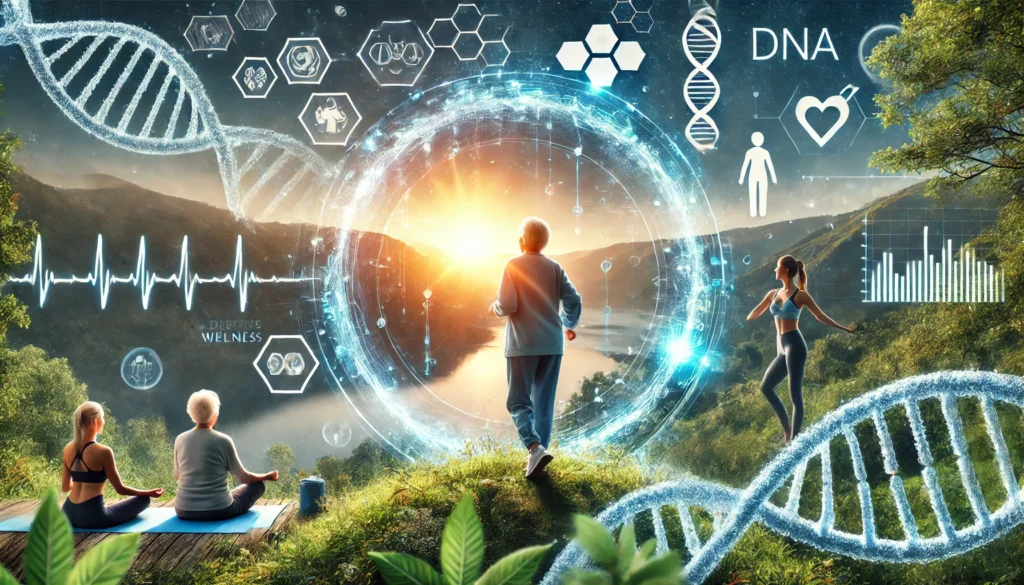
Understanding Healthy Aging and Life Extension – Its Benefits
Healthy aging is the process of optimizing your physical, mental, and social well-being as you age. It involves adopting habits that not only improve your quality of life today but also ensure you stay sharp and strong in the future.
This means making lifestyle changes, like exercising regularly, eating a balanced diet, and managing stress effectively. These habits help prevent age-related decline and reduce the risk of chronic illnesses. The benefits are clear: you get to spend more time with loved ones, enjoy the activities you love for longer, and maintain independence as you age.
Additionally, healthy aging helps preserve your cognitive function, allowing you to stay mentally active and alert. Maintaining strong social connections also contributes to your well-being, as staying socially engaged has been shown to improve mood and reduce feelings of loneliness.
When you age healthily, you are more likely to lead a fulfilling life, full of experiences that matter to you. Healthy aging is not just about living longer, but also about living better, with more energy and resilience to face the challenges of aging.
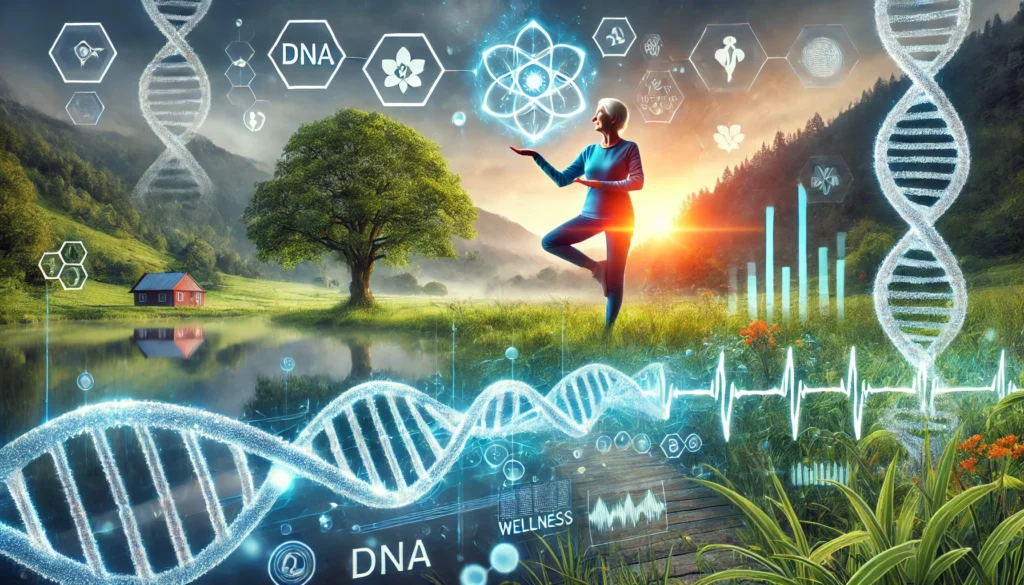
Scientific Advancements in Life Extension and Lifespan
Recent Breakthroughs in Longevity Research
The science of aging, also known as geroscience, is pushing the boundaries of what we thought possible. Researchers have been exploring the role of genes, cells, and even our environment in determining lifespan. This field looks at how our bodies age and aims to uncover the factors that speed up or slow down aging.
For example, studies on calorie restriction have shown promising results in extending the lifespan of various animals, hinting that dietary changes could help humans live longer too. Additionally, research has focused on understanding how specific genes affect aging, with some genes linked to longer life and others to age-related diseases. Scientists are also investigating cellular senescence, which is when cells stop dividing but don’t die. These so-called “zombie cells” can cause inflammation and contribute to aging. By targeting these cells, researchers hope to slow aging and improve health in later years.
Environmental factors, like pollution and lifestyle choices, also play a crucial role. Understanding these influences could help create strategies that extend both lifespan and healthspan. Ultimately, these advancements could lead to treatments that not only extend how long we live but also how well we live as we age.
Role of Stem Cells and Regenerative Medicine
Stem cells—the body’s natural repair toolkit—hold great promise for life extension. Regenerative medicine uses stem cells to repair damaged tissues and may one day slow or even reverse the effects of aging.
These cells have a unique ability to transform into different types of cells, which makes them invaluable for healing. Imagine regaining the vitality of your younger years by literally regenerating your body from within. Stem cell therapy aims to rejuvenate damaged organs, replace lost tissue, and restore essential functions. This treatment could address age-related issues like muscle weakness, joint pain, and even cognitive decline.
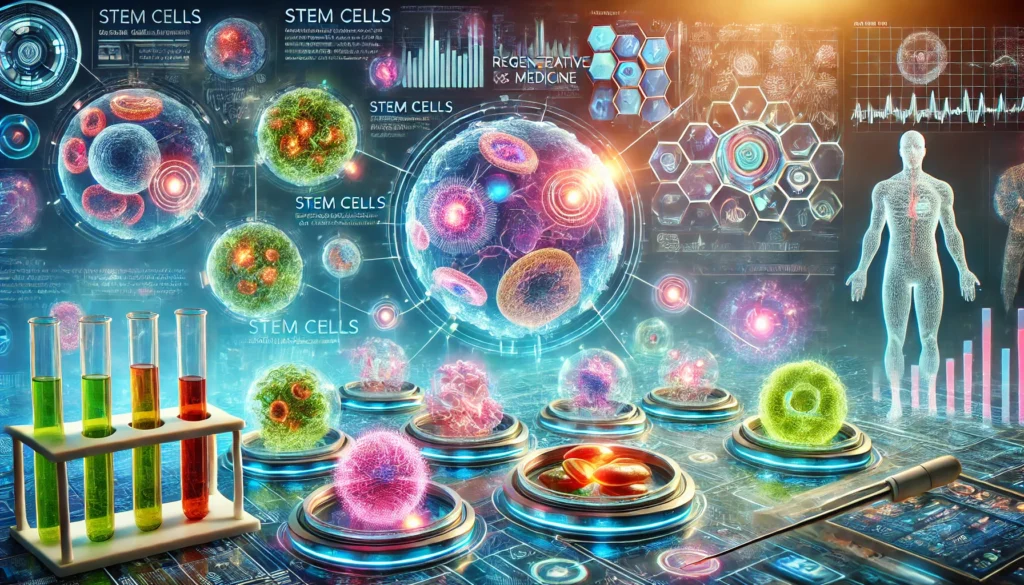
Moreover, stem cells are being studied for their role in reversing cardiovascular damage, which is a leading cause of aging-related deaths. Scientists are also exploring ways to use stem cells to regenerate skin cells, potentially erasing wrinkles and other signs of aging. This is not science fiction anymore; it’s becoming a tangible reality through ongoing research. With advances in stem cell therapies, we may soon see treatments that allow people to live not just longer, but also with improved health and reduced symptoms of aging. Researchers continue to uncover new ways these cells could be used, bringing us closer to a future where age-related decline is significantly slowed or even halted.
Natural Methods to Support Healthy Aging
Importance of Sleep and Stress Management
Sleep is like your body’s nightly maintenance service—it repairs your cells, processes memories, and balances hormones. It’s during deep sleep that growth hormones are released, promoting cell repair and renewal.
Chronic stress, on the other hand, can accelerate aging by increasing inflammation and negatively impacting immune function. Stress also affects sleep quality, creating a vicious cycle that harms overall health. Managing stress through techniques like meditation or spending time in nature can significantly contribute to healthy aging. Physical activity, even just a short walk, also helps reduce stress levels effectively.
Yoga and breathing exercises are great for calming both the body and mind. The calmer you are, the better your body ages. Socializing with friends and engaging in hobbies are also effective ways to reduce stress. When you manage stress well, your sleep quality improves, your cells repair better, and your body maintains its youthful vigor. By reducing stress, you can effectively slow the aging process and maintain mental sharpness. Finding what works for you, whether it’s a relaxing hobby or deep breathing exercises, can have long-lasting effects on how well you age.
Supplements and Vitamins Linked to Healthy Aging
Certain supplements can support healthy aging. Vitamins like D and B12, Omega-3 fatty acids, and minerals such as magnesium help in keeping your body functioning at its best. Vitamin D is essential for bone health, while B12 supports nerve function and energy levels.
Omega-3 fatty acids are well known for promoting heart health and reducing inflammation, which is crucial as we age. Supplements such as resveratrol (found in grapes) have also been linked to longevity, thanks to their antioxidant properties that protect cells from damage. Coenzyme Q10, another supplement, helps improve cellular energy production, which can reduce fatigue and improve overall well-being.
Probiotics also play a role by supporting gut health, which is directly linked to immune function. Just remember, supplements are not magic pills; they work best when paired with a balanced diet and a healthy lifestyle. Eating a diet rich in fruits, vegetables, and whole grains ensures you get a wide range of nutrients that support healthy aging. Supplements should fill in gaps, not replace nutritious foods. Consistent use, alongside other healthy habits, can make a difference in how you age and maintain vitality.
Diet and Exercise for Longevity
Foods That Promote a Longer Life
What you eat is crucial for how long you live. Diets rich in fruits, vegetables, whole grains, and lean proteins have been linked to longer lives. Consuming a wide variety of colorful vegetables ensures you get essential vitamins and minerals, which help protect against age-related diseases.
The Mediterranean diet, known for its abundance of healthy fats, nuts, and leafy greens, has been shown to promote longevity. Olive oil, a key component of this diet, contains antioxidants and anti-inflammatory properties that protect cells from aging. Adding antioxidant-rich foods like berries can also help by combating free radicals that contribute to aging.

Foods like nuts, seeds, and fish are rich in Omega-3 fatty acids, which are known to support heart health and reduce inflammation. Green tea, another powerful antioxidant, helps fight cellular damage and can improve overall well-being. Including fiber-rich foods like oats and legumes aids in digestive health, which is important as we age. These dietary choices not only support a longer life but also ensure a better quality of life by maintaining energy and preventing chronic conditions. Making these healthy food choices consistently can significantly impact how well you age.
The Benefits of Regular Physical Activity for Aging Well
Exercise isn’t just about looking good; it’s about keeping your body young and resilient. Regular physical activity can slow down cellular aging, improve mental health, and boost the immune system.
Moreover, staying active helps maintain muscle mass, which tends to decline with age. Activities like walking, swimming, or yoga can keep you mobile and flexible, reducing the risk of age-related diseases. Strength training, even using light weights, helps to keep bones strong, lowering the risk of osteoporosis. Exercise also supports cardiovascular health, which is crucial for reducing heart disease risk.
Engaging in activities that raise your heart rate, such as brisk walking or cycling, helps keep your heart strong. Additionally, exercise releases endorphins, which improve mood and help combat age-related depression. Balance exercises, like tai chi, are beneficial for preventing falls, a common concern as people age. The key is to find activities you enjoy, making it easier to stay consistent. Even moderate activity, such as gardening or dancing, can provide significant health benefits. The goal is to move regularly, maintain strength, and support overall well-being as you age.
The Role of Genetics in Life Extension
Your genes play a significant role in determining your lifespan, but they aren’t the full story. Advances in genetic research have shown that while you may be predisposed to certain conditions, lifestyle choices can significantly alter those outcomes. This means that even if you carry genes linked to a shorter lifespan, healthy habits can still make a big difference.
Genetic interventions, such as gene editing using CRISPR, hold the potential to turn off genes that accelerate aging or activate those that promote longevity. CRISPR technology allows scientists to make precise modifications to DNA, which could eliminate harmful mutations. Moreover, ongoing research aims to identify key genetic markers that influence aging. Understanding these markers could enable personalized approaches to extending lifespan.
Additionally, researchers are exploring epigenetics, which studies how environmental factors can switch certain genes on or off. These changes don’t alter DNA itself but can impact how genes are expressed, affecting health and aging. Advances in epigenetic treatments may provide new ways to influence longevity without direct genetic editing. Combining lifestyle changes with genetic interventions could lead to more effective strategies for extending a healthy lifespan.
Technologies and Treatments for Extending Lifespan
Genetic Interventions and CRISPR
CRISPR technology allows for precise changes in DNA, offering the possibility of directly targeting the causes of aging at a genetic level. This technology could lead to breakthroughs that enable us to eliminate genes linked to age-related diseases or enhance genes that promote longer life.
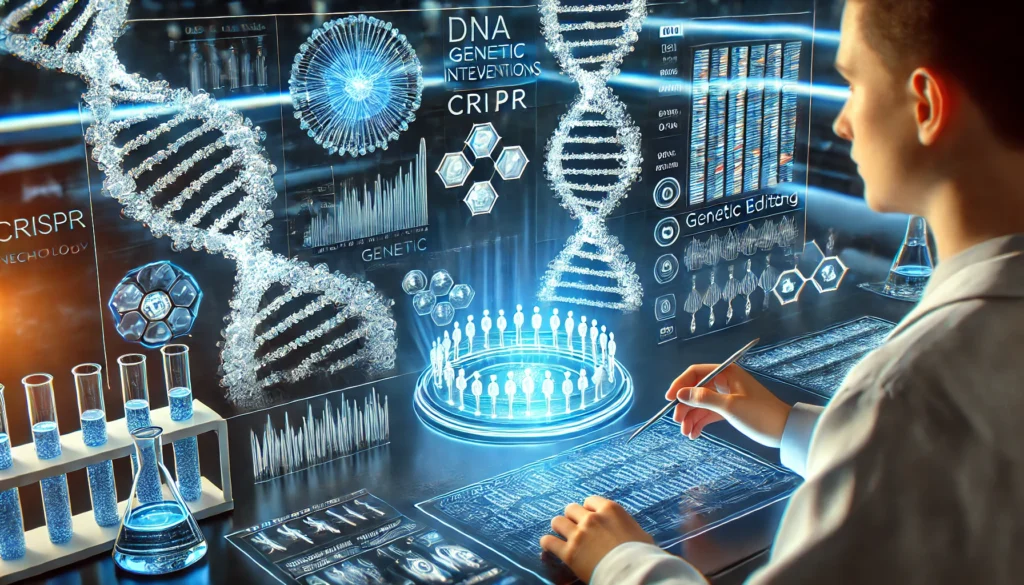
Moreover, CRISPR’s ability to edit genes with pinpoint accuracy means researchers can develop targeted treatments for specific aging-related conditions. This precision minimizes unintended effects, making interventions safer and more effective. Additionally, CRISPR holds potential for combating age-related diseases like Alzheimer’s by directly addressing their genetic causes. By turning off harmful genes or activating beneficial ones, CRISPR can significantly improve healthspan.
Scientists are also exploring how CRISPR might be used in conjunction with other technologies, such as stem cell therapy, to create comprehensive anti-aging solutions. For example, edited stem cells could be used to regenerate damaged tissues more effectively. As research progresses, the hope is that CRISPR will help not only in extending lifespan but also in enhancing the quality of those added years, ensuring people remain healthy, active, and free from debilitating conditions. The future of gene editing in aging research is promising, bringing us closer to personalized medicine for longevity.
Hormone Therapy and Anti-Aging Drugs
Hormone levels naturally decline as we age, leading to reduced muscle mass, increased fat, and even mood swings. Hormones like testosterone, estrogen, and growth hormone all decrease, affecting various bodily functions. Hormone therapy aims to restore these levels, potentially improving quality of life and reducing symptoms of aging.
For instance, testosterone replacement can help increase muscle mass and energy levels in older adults. Similarly, estrogen therapy can help reduce menopause symptoms, improving mood and bone health. Growth hormone therapy is also being studied for its potential to enhance muscle strength and mobility.
Similarly, anti-aging drugs like rapamycin are being explored for their ability to mimic the effects of calorie restriction, which has been linked to increased lifespan. Rapamycin works by targeting specific pathways that affect cell growth and metabolism, slowing down the aging process. Another promising drug is metformin, commonly used for diabetes, which is now being studied for its potential anti-aging effects. These therapies, combined with lifestyle changes, may significantly impact aging and improve overall well-being. While still under research, hormone therapy and anti-aging drugs offer hope for extending healthspan, allowing individuals to enjoy longer, healthier lives.
Challenges and Myths About Aging and Longevity
Aging comes with its share of myths. No, there’s no miracle cure that will let you live forever. Claims of anti-aging pills or magic diets often mislead people, creating false hope. It’s crucial to distinguish between scientifically-backed methods and snake oil solutions that promise unrealistic results.
One common myth is that certain supplements alone can stop aging. While supplements may help, they aren’t a substitute for a healthy lifestyle. Another myth suggests that extreme diets can significantly extend lifespan without risks. Extreme diets often lead to nutrient deficiencies, which can do more harm than good. The real key to longevity lies in adopting consistent, healthy habits rather than looking for quick fixes.
Regular exercise, balanced nutrition, stress management, and quality sleep are proven methods to support healthy aging. Instead of wasting money on unproven products, focus on evidence-based approaches that enhance well-being. Building strong social connections and keeping an active mind are also essential. Aging well is about making sustainable choices every day that support both physical and mental health. Remember, there is no shortcut—just daily actions that compound over time to improve health and longevity.
How to Integrate Healthy Aging Habits Into Your Daily Life
Healthy aging isn’t about dramatic lifestyle overhauls; it’s about small, consistent steps. Start with achievable goals, like swapping sugary snacks for fruits or adding a daily 20-minute walk. Begin by making one change at a time, which helps in building sustainable habits.
Incorporate mindfulness practices, like meditation or deep breathing, to manage daily stress and improve mental health. Prioritize sleep by maintaining a consistent sleep schedule and creating a relaxing bedtime routine. Quality sleep is essential for cellular repair and emotional balance. Keeping your social connections strong is also crucial—engaging in regular conversations or participating in group activities can significantly boost your mood and cognitive health.
Each of these habits plays a vital role in maintaining both your physical and mental well-being as you age. Gradually, add strength exercises to maintain muscle mass and flexibility exercises like yoga to support joint health. Staying socially active by joining clubs or volunteering can create a sense of purpose, which is important for emotional well-being. Making these small, steady improvements helps ensure you not only live longer but also stay healthier and happier in the long run.
FAQs about Life Extension
What Is Life Extension and How Does It Work?
How Can I Age Healthily and Extend Life?
What Are the Most Effective Habits for Healthy Aging?
How Does Genetics Influence Life Expectancy?
Are There Supplements That Can Help Extend My Lifespan?
What Recent Scientific Breakthroughs Have Been Made in Aging Research?
What Role Does Exercise Play in Extending Lifespan?
What Technologies Are Available for Human Life Extension?
Are There Any Myths About Aging That Are Not True?
How Can I Start Integrating Life Extension Habits Into My Daily Routine?
Conclusion
Life extension is not just about living longer but living well, with vitality and purpose. The advancements in science, combined with natural and sustainable lifestyle choices, offer us a glimpse of a future where age does not limit our potential. By integrating healthy habits, exploring scientific innovations, and challenging misconceptions about aging, we can all work towards a longer, healthier, and more fulfilling life. Remember, small consistent actions today can create a massive impact on how you age tomorrow.

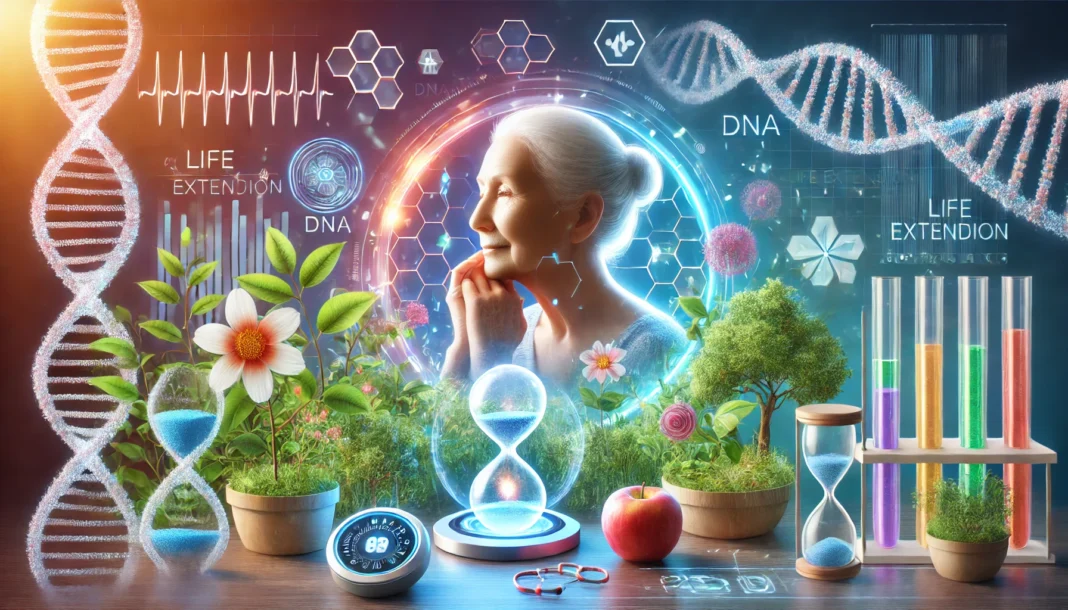
Great stuff Zain!
Thank You, Abby! Keep Reading!